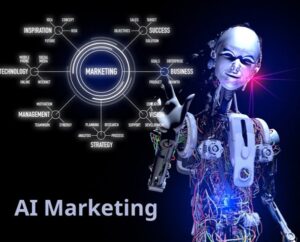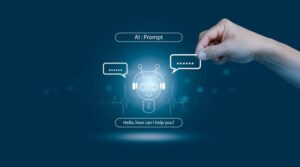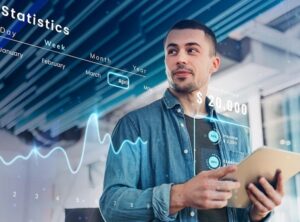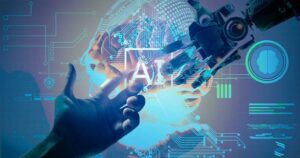AI Marketing not only helps businesses improve their marketing strategies but also creates personalized customer experiences that deliver high effectiveness.
Beyond just content creation, AI Marketing today is being used in a wide range of marketing activities such as customer service, data analysis, and personalized messaging — all with superior efficiency. According to McKinsey & Company, applying artificial intelligence in marketing can increase ROI by up to 30% compared to traditional methods. That’s why in this article, Lifesup AI will help you better understand what AI Marketing is and how it can be applied to boost your competitive edge in the market.
What is AI Marketing?
AI Marketing refers to the integration of artificial intelligence (AI) technologies into marketing strategies to optimize customer outreach, enhance campaign performance, and deliver personalized customer experiences.
Unlike traditional marketing methods, AI Marketing leverages a range of technologies such as machine learning, natural language processing (NLP), and conversational AI to understand and interact with customers more intelligently. This allows businesses to optimize their marketing strategies, improve customer experience, reduce operational costs, enhance team productivity, and drive sustainable revenue growth.

Key Benefits of AI Marketing
Over the past three years, the concept of AI Marketing has become increasingly common both globally and in Vietnam. This technology now plays a role in various marketing activities such as AI-powered customer service chatbots, automated content generation, and scheduling posts across social media platforms. The rapid rise of AI in marketing is largely due to the significant benefits it offers:
Faster and More Accurate Decision-Making
By utilizing deep learning technologies and machine learning algorithms, AI can process vast volumes of data in real-time. This enables marketers to quickly analyze customer behavior, forecast market trends, and evaluate marketing performance — helping them make data-driven decisions instantly.
Improved ROI
AI enhances ROI (Return on Investment) by delivering deep insights into customer data. AI tools can identify the most effective advertising channels, optimize promotional strategies for each customer touchpoint, and personalize marketing content for individual customers. As a result, AI-powered campaigns can target more accurately and convert more efficiently.
Real-Time KPI Tracking
AI Marketing technologies enable marketers to monitor and measure key performance indicators (KPIs) across multiple channels in real-time. This visibility helps them determine which campaigns are performing well and which ones require adjustments for improvement.
Enhanced Customer Relationship Management (CRM)
AI strengthens customer relationship management by automating and optimizing customer service activities — for example, AI chatbots that can respond to customers 24/7. In addition, AI Marketing allows businesses to gain deeper insights into customer profiles and behavior through data analysis. With these insights, brands can develop highly personalized marketing campaigns without overextending their resources. These impacts lead to a smoother customer experience, stronger connections, and increased customer loyalty.

In-depth Customer Data Utilization
Collecting and analyzing customer data is a major challenge for many marketers, especially in the realm of digital marketing where data is vast and complex. Meanwhile, AI technologies can effortlessly analyze this data within seconds. Moreover, some AI marketing tools use machine learning algorithms to predict future customer behavior based on existing data. This allows marketers to better understand customer preferences and develop more personalized marketing plans and content.
Enhancing Personalization in Marketing
Today, customer demand for personalization is increasing rapidly—they expect products and services that match their personal needs and preferences. AI is the key solution that helps marketers meet this demand effectively.
Many AI marketing tools can customize tasks such as sending marketing emails, push notifications, social media ads, or messages based on each customer’s demographics, behaviors, and preferences. This not only boosts conversion rates but also enhances customer satisfaction and engagement.
Cost Savings and Increased Efficiency
AI reduces marketing costs by automating repetitive tasks such as content creation, A/B testing, and data analysis. This helps marketers save time and staffing costs while minimizing human error. As a result, marketers can focus on more strategic activities like content reviewing, ideation, and campaign planning, thereby increasing the overall effectiveness of marketing campaigns.
Common AI Technologies Used in Marketing
With the advancement of AI, its applications in marketing have become diverse—enabling content creation, communication, and even future forecasting. So, what specific technologies are commonly used in AI marketing? Let’s explore with VNPT AI:
Machine Learning (ML)
Machine Learning is a branch of Artificial Intelligence that enables machines to learn and improve prediction capabilities from data without explicit programming. For marketers, ML is a powerful tool to understand and forecast customer behavior. By analyzing past data, ML models can provide predictions such as: which customers are more likely to convert, which audience segments are less promising, or which marketing channels will perform best for a given brand.
Additionally, ML can forecast future business performance, helping predict revenue or the number of potential customers. It also supports product pricing optimization to better align with market demands. Most importantly, ML enhances customer targeting, increasing conversion rates and improving overall marketing campaign effectiveness.

Generative AI
Generative AI, or Gen AI, is a technology capable of creating entirely new content based on human input. Since the launch of ChatGPT at the end of 2022, Generative AI has created a global buzz—and the marketing industry is no exception. So, how is Gen AI being applied in AI Marketing?
Today, Generative AI can produce not only text but also images, videos, music, and more—with increasingly high quality. As a result, using Gen AI to support content creation in marketing has become very common.
According to statistics from the Marketing Insight Group, up to 73% of marketers have used or are currently using Generative AI in their work. In fact, proficiency with Generative AI tools has become a standard hiring requirement in many marketing departments.
Beyond content creation, Generative AI helps brands discover new resources and ideas, develop existing ones, enhance creativity, and scale their content production processes.
Natural Language Processing (NLP)
In AI Marketing, Natural Language Processing (NLP) is also a key technology. It enables computers to understand, analyze, and generate human language—similar to how virtual assistants like Siri or Alexa operate. NLP is the core technology behind Generative AI, allowing it to create human-like, natural-sounding text.
NLP also powers chatbots by helping them understand and respond to customer inquiries in natural language.
In addition, NLP can analyze customer feedback from various sources such as product reviews, social media comments, or online discussions—giving marketers insights into customer thoughts and desires.
Another application of NLP is sentiment analysis, which tracks customer emotions in response to marketing campaigns. This helps brands identify potential issues, detect negative sentiment early—the root of potential PR crises—and proactively adjust their strategies for more effective marketing outcomes.
Conversational AI
Conversational AI is a technology that enables machines to simulate human-like conversations through text or voice interactions.
In the field of AI Marketing, chatbots and virtual assistants are the most recognizable applications of Conversational AI. These tools can provide 24/7 customer support, respond to inquiries, guide users through purchases, and even help identify and categorize potential leads.
Additionally, Conversational AI can be used in employee training programs—helping new hires better understand products and get familiar with their roles more quickly.

Practical Applications of AI in Marketing
AI marketing has been widely adopted across various industries, helping businesses enhance their operational efficiency and boost business performance. Some real-world applications of AI in marketing include:
Creating Multi-format, Multi-platform Content
When discussing the concept of AI marketing, content creation tools powered by AI are indispensable. With the advancement of artificial intelligence, creating content for marketing campaigns has become easier than ever. AI tools like ChatGPT, Gemini, and Grok help generate blog posts, social media content, email marketing messages, and more at remarkable speed. The types of content that AI can now produce are also diverse — from text and images to videos and beyond.
Using these tools not only saves time for marketers but also aids in generating fresh, engaging ideas that attract customers. This is particularly valuable for businesses without a professional writing team or those needing large volumes of content in a short amount of time.
Analyzing and Predicting Customer Behavior
AI marketing enables the analysis and processing of vast amounts of user data from online activities, allowing businesses to better understand customer behavior and needs. This technology can track customer habits and also predict future trends based on collected data models. This helps marketers create precisely targeted strategies, optimize content, and improve conversion rates.
AI Chatbots for 24/7 Customer Support
One of the most common applications of AI in marketing is the deployment of AI-powered chatbots that provide customer support across multiple channels. These chatbots use natural language processing (NLP) technology to understand and respond to customer inquiries accurately and promptly, just like a human representative.
Modern chatbots are becoming increasingly intelligent — not only answering frequently asked questions but also suggesting products based on customer behavior analysis. Many chatbot solutions now offer cross-platform integration, ensuring a seamless and consistent user experience. This helps businesses provide better customer care, reduce the workload on support teams, and enhance the overall customer experience.
Automating Email Marketing
One of the most popular uses of AI in marketing automation is the ability to generate personalized emails based on customer demographics, behavior, and preferences — helping to increase open rates and improve ROI.
For example, if a customer browses a website and shows interest in a particular product, AI can automatically send an email introducing that product or related offerings. This not only saves time but also increases conversion potential and fosters long-term customer relationships.

Optimize SEO with AI
AI tools can analyze user keywords and search trends to improve a business’s SEO strategy. These tools are also used to optimize SEO content, helping websites achieve higher rankings on search engines. Additionally, some businesses have utilized AI to generate basic SEO articles, which marketers can then fine-tune. This allows for large volumes of SEO content to be produced in a short amount of time.
Personalize Customer Experience
AI marketing enables brands to personalize customer experiences by analyzing data from past interactions to better understand customer behavior and generate more relevant suggestions. For example, an e-commerce platform or online store can recommend products based on a customer’s purchase history, or a music streaming service can create personalized playlists based on individual listening habits.
Accurately Predict Market Trends
AI can leverage forecasting models and data analysis to identify emerging trends in the market. By analyzing factors such as product demand, customer behavior, and even social, economic, and political contexts, this technology helps businesses gain deeper insight into potential market shifts and adjust their strategies accordingly.
Effective Customer Segmentation
Artificial intelligence can segment customers based on more in-depth factors such as behavior and personal preferences. With this segmentation, businesses can target specific customer groups and implement tailored marketing campaigns. Accurate customer segmentation with AI marketing helps improve the quality of advertising campaigns and increases conversion rates.

Creating Technological Platforms to Increase Customer Engagement
Many brands have leveraged AI technology to develop tools that enhance customer interaction during marketing campaigns. For instance, L’Oréal launched ModiFace – an AI-powered tool that allows customers to try on lipstick and eyeshadow virtually. Nike introduced the Nike Fit platform, which uses AI to scan customers’ feet and recommend the most accurate shoe size. Coca-Cola also applied AI to create the Create Real Magic platform, enabling users to chat with Santa Claus.
These fascinating technologies offer unique experiences for marketing campaigns and, more importantly, strengthen the engagement between brands and consumers.
Challenges and Limitations of Using AI in Marketing
Despite its many benefits and practical applications, integrating AI into marketing also requires businesses to address several existing limitations. So, what specific challenges might companies face when adopting AI in marketing?
-
Training AI remains a complex task: Like humans, AI must be “trained” to learn new tasks. For example, if you want to develop an AI that can engage customers effectively, you’ll need to invest time and resources to train it. This requires a large volume of customer preference data and may involve data experts to ensure that the input data is clean and appropriate. In the future, advanced technologies such as AGI (Artificial General Intelligence), with self-learning capabilities, may help solve this problem.
-
Ensuring data quality and accuracy: AI marketing only performs strongly and effectively when trained on high-quality data. Regardless of how advanced the AI tools are, if the training data is inaccurate or does not reflect reality, the AI’s outputs and decisions will be of low quality and ineffective.
-
Complying with data privacy laws: AI is often trained on personal data and customer behavior, which can impact consumer privacy. Therefore, businesses must comply with data privacy regulations when implementing AI solutions.

Trends and the Future of AI in the Marketing Industry
With its growing impact, artificial intelligence (AI) will continue to be deeply integrated into the marketing industry. Specifically, several noteworthy AI trends in marketing for 2025 include:
Enhanced AI Automation
It is forecasted that by 2025, the level of AI-driven automation in marketing will significantly increase, with the ability to handle a wider range of tasks.
Among these, AI chatbots are expected to handle up to 85% of customer interactions next year without human intervention, boosting efficiency and improving customer service.
At the same time, AI Marketing will increasingly automate other tasks such as: ad optimization (content, placement, bidding), real-time marketing budget adjustments, and automatic content distribution based on user behavior. Platforms like Google Ads and Meta Ads have also integrated AI to help advertisers automatically optimize campaign performance, thus reaching potential customers at lower costs.
AI’s automation capabilities will become more common in creative fields as well, including writing product descriptions, email marketing, social media posts, and even automating content distribution across platforms.
Personalized Marketing Strategies
Personalization has always been a key trend in marketing, and AI Marketing plays a vital role in this. In 2025, AI will continue to help businesses analyze customer behavior and preferences on a deeper level. This will allow brands to personalize the customer experience across multiple platforms, such as: personalized marketing content, tailored promotions, and displaying ads based on users’ web behavior.
AI’s Increasing Role in Decision-Making
In 2025, AI marketing tools will become powerful digital assistants helping business leaders make more accurate data-driven decisions. These tools will optimize many aspects of management, from simple tasks like generating reports to more complex roles such as financial forecasting and supply chain management.
Strengthening AI Ethics and Governance
With the rapid growth of AI, ethical and governance issues will become increasingly important. Businesses will need to establish clear policies and ethical guidelines to ensure responsible AI usage, protect consumer rights, and maintain data privacy. At the same time, brands must understand AI advertising regulations in each country to avoid legal violations.
AI’s Impact on the Workforce
The widespread adoption of AI Marketing will bring significant changes to the labor market in the future. Previously, there were concerns that AI automation would result in job losses. However, in reality, AI has even created new opportunities, especially in roles that require creativity and strategic thinking. According to the World Economic Forum (WEF), AI is expected to contribute to the creation of 97 million new jobs by 2025.
Therefore, marketers need to equip themselves with essential AI skills to remain competitive in a rapidly evolving job market. McKinsey forecasts that by 2030, 30% of current working hours could be automated thanks to AI.
Conclusion
We hope that the information from Lifesup AI has provided you with a comprehensive overview of what AI Marketing is and the key characteristics of this technology. Overall, the application of artificial intelligence in marketing is set to become an inevitable trend in the future. Technologies such as machine learning, natural language processing, and conversational AI are increasingly being integrated into various marketing activities—from customer service and content creation to insight analysis. Therefore, brands need to quickly grasp emerging AI Marketing trends to effectively leverage them in the near future.

